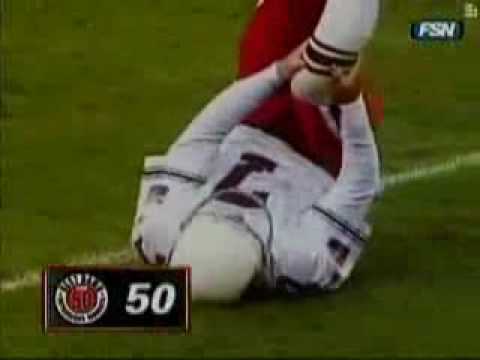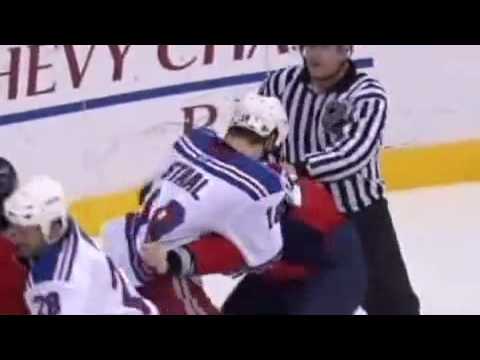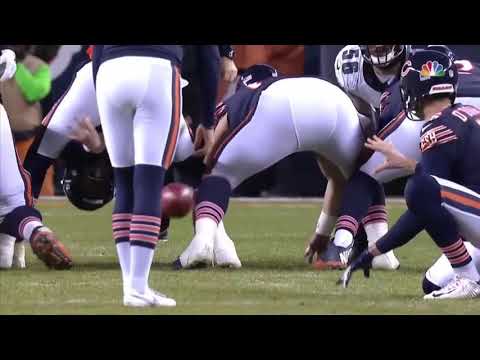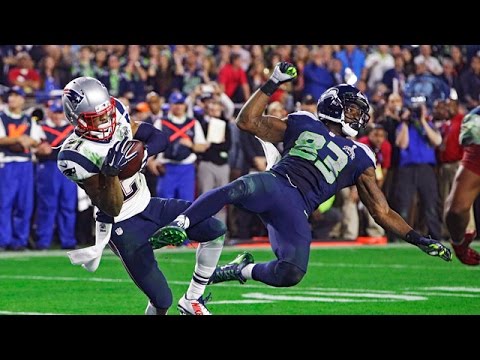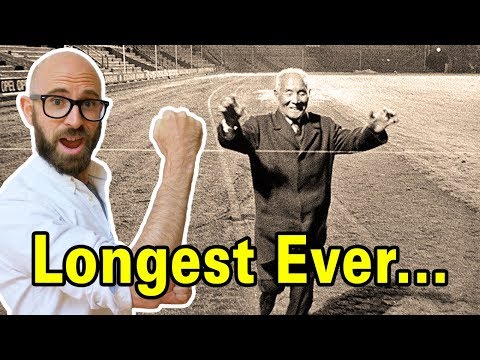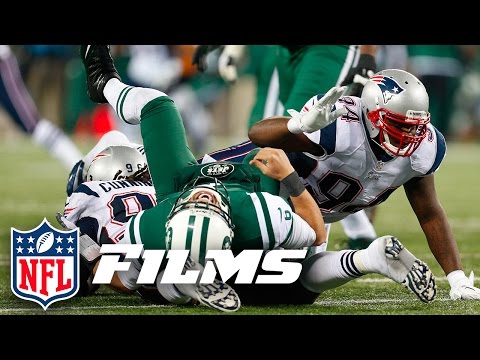Two quick things before diving into this list. First, this list is meant to be lighthearted, so I’m not including any incidents that resulted in people getting hurt or killed for their failures. Secondly, my rubric for judging how much they are known for their gaffe is based on the auto-complete feature in Google. So if one of the top three search options is the person’s name and their mistake, I count it. With that said, let’s look at 10 athletes who are famous for their mistakes.
10 Bill Gramatica Celebration Injury
Bill Gramatica is a former NFL kicker drafted by the Arizona Cardinals in 2001. As a rookie, he went 16/20 in field goals and 25/25 in extra points, setting a rookie franchise record of 73 points scored. He probably could have scored more had he not famously gotten injured on December 15, 2001. After nailing a field goal, Gramatica took a running leap before making an awkward landing and falling to the ground clutching his leg. It turns out his celebratory jump ended with him tearing his ACL. The kicker is that this all happened in the first quarter on a 42-yard kick. Not really the most dramatic circumstances to warrant such a celebration. Gramatica recovered and spent a few more years in the NFL, but his injury is still what he is most known for. To his credit, he is able to look back and laugh. In 2010, he corrected an interviewer who said he got injured from jumping. “My jump was excellent. It was my landing I needed to work on” I agree with him. If you stop the video just as he lands, it is a pretty good celebration. As a special note: due to his injury, the late, great Pat Tillman handled kickoff duties for the rest of the game.[1]
9 Lindsey Jacobellis
The most decorated female snowboard cross athlete ever is not known for her five world championships but for her last-minute celebration that knocked her from gold to silver in the 2006 Winter Olympics. Jacobellis was almost 150 feet (46 meters) ahead of her competition, which equates to about a 3-second lead (that’s how fast they go), when she attempted a method grab on the second to last jump to add a little flare to her victory. Unfortunately, that flare caused her dreams to go up in smoke as she fell and was overtaken by Tanja Frieden, earning her quite possibly the most disappointing silver medal in history. At first, Jacobellis said the method grab was meant to stabilize her board but later owned up that she was excited and wanted to pump up the crowd. Watch this video on YouTube Despite her unparalleled success at the X-Games and world championships, Jacobellis continued to struggle when it came to the 2010 and 2014 Olympics. She began to wonder if her 2006 fall was all she would be known for. Eventually, she teamed up with a mental skills coach named Denise Shull, who encouraged her to analyze, normalize, and embrace that defining moment of 2006. Whatever they did worked because, in 2022, Jacobellis won the Olympic gold she had been chasing after for years. Jacobellis may still be known for her fall, but now it is in the greater context of a redemption arc.[2]
8 Alexander Semin Fight
In the broadest sense, there are two kinds of hockey players: the big hitters that will punish you if you touch the puck and the skill guys who score goals like I eat cookies. Suffice to say, if you’re unfamiliar with who Alexander Semin is, you’ll definitely know what kind of player he is after watching this fight against New York Ranger Marc Staal in 2009. In an attempt to stick up for his goalie who was knocked down by Semin, Staal grabs Semin by the jersey, and they begin to tussle. Semin wriggles out of his jersey and then proceeds to… “play the drums” on Staal’s chest—as announcer Joe Benenati stated. You really have to watch this video to understand just how weird this was. And if you were wondering. Yes, this was Semin’s very first and only fight in the NHL.[3]
7 The Cody Parkey Double Doink
With less than 10 seconds left in the 2019 NFC wildcard playoff game between the Chicago Bears and Philadelphia Eagles, the Bears set Parkey up for a 43-yard field goal. Parkey blasted the ball through the uprights for the game winner, but before the snap, Eagles coach Doug Pederson called a time-out, so the kick didn’t count. Parkey again attempted the 43-yarder only to see it ricochet off the left upright, hit the crossbar, and land in front of the field goal. The Bears lost the game and ended their season by a score of 16-15. It wasn’t really the kick that cemented the legacy of Parkey; it was more the call from NFL commentator Chris Collinsworth, “Oh my goodness… the Bears’ season’s gonna end on a double doink.” It was those final two words that took off all over the internet. There’s just something about how double doink rolls off the tongue and how it evokes that feeling you get when you hear the fail music from The Price is Right. Although it was later revealed in the game tape that the Eagles’ defensive tackle Treyvon Hester just barely blocked the kick and caused the ball to stray off course, the damage had already been done to Parkey’s reputation. Just as a reference to how much this took off, the double doink actually has its own Wikipedia page! [4]
6 Patrik Stefan Missed Empty Net
It was January 2007, and the Dallas Stars were holding a 5-4 lead over the Edmonton Oilers with 12 seconds left in the game. The Oilers pulled their goalie for an extra attacker. As the Oilers went up the ice, Stefan came up with a steal and skated in all alone toward the empty net. Instead of shooting from a short distance, Stefan decided to go for the casual skate and tap into the net. But the puck hit a divot in the ice and bounced over his stick. Trying to maintain control, he fell to the ice and ended up passing it to the Oilers, who quickly transitioned and scored a goal to force overtime. Although Dallas ended up winning the game in a shootout, this moment gained Stefan a lot of notoriety in the worst way. I think the play-by-play announcer described it best: “Oh, I thought he was gonna until he blew it! The cherry on top is that there were 12 seconds left. Had he done anything else than what he did, Dallas would not have had to go into overtime. Stefan only played 13 more games in the NHL after that. He now coaches teens in the Detroit area and often tells them after a bad shift or game, “There’s always next shift, next game. I didn’t kill somebody. It’s a game. Mistakes happen.”[5]
5 Steven Bradbury’s Unlikely Win
Steven Bradbury is a four-time Olympic speed skater who was the first person from the southern hemisphere to win a gold medal at the Winter Olympics. He is a source of pride for Australia, yet all anyone really remembers is how he won that gold medal. It was at the 2002 Winter Olympics in Salt Lake City, Utah. Bradbury was in his fourth Winter Olympics and was almost 30, making him the second-oldest competitor. He managed to make the semi-finals after another racer was disqualified but recognized that he could not match up to the much quicker, younger skaters like Apolo Ohno. So Bradbury developed a strategy of hanging back from the other racers, hoping they would crash. Sure enough, that is what happened, and Bradbury took first in his semi-finals race. Bradbury was in dead last during the final race until the final corner when the frontrunners caused a pileup. Bradbury cruised by to earn Australia’s first gold medal. After the race, Bradbury had this to say, “Obviously, I wasn’t the fastest skater. I don’t think I’ll take the medal as the minute-and-a-half of the race I actually won. I’ll take it as the last decade of the hard slog I put in.” Many American commentators were not happy with Bradbury’s win but accepted that the risk-taking behavior of the favorites was what allowed him to win. Nevertheless, Bradbury is seen as an underdog and a hero to many. His win was so impactful to Australians that he is directly referenced in the phrase “do a Bradbury,” which means to succeed in an unlikely way.[6]
4 Pete Carroll Not Running the Ball
There’s a reason why Pete Carroll is one of the longest-tenured NFL coaches in the league today, but he is also famous for one of the most questionable play calls in the history of the sport. In 2015, the Seattle Seahawks were going for their second Super Bowl in three years. With only 26 seconds left in the game and down 28-24 against the New England Patriots, the Seahawks found themselves less than a yard from the end zone on 2nd-and-goal. Everyone watching this game knew what was going to happen next: Beast Mode. Marshawn Lynch earned the nickname Beast Mode due to his explosive running game that shredded through defenders. To get an understanding of his power, you have to watch his legendary game-winning run against the Saints in 2010. So you’re about two feet from the goal line, and you’ve got one of the most powerful running backs in the game. No brainer, right? That’s why the next play was so shocking. Instead of handing the ball off to Lynch, Seahawks quarterback Russel Wilson threw a pass aimed at Ricardo Lockette. The pass was intercepted by Patriots rookie Malcolm Butler. It was his first career interception. The Seahawks lost the Super Bowl, and all anyone could think about was why Lynch wasn’t carrying the ball. Fans, Seahawks players, and analysts were all second-guessing Carroll. I mean, they had a chance to take out the Brady/Belichick Patriots, and they blew it. That final play also birthed a great meme of Seahawks defender Richard Sherman looking on in shock and terror as the interception occurs.[7]
3 Armando Galarraga’s Almost Perfect Game
The perfect game is one of the rarest feats in all of sports. For those unfamiliar, a perfect game is when a pitcher goes nine innings without letting a single batter get on base. In nearly 150 years of professional games, only 20 players have accomplished the feat. It is something special, and the Detriot Tigers’ Armando Galarraga was so close to capturing one, and many argue he did. In a 2010 game against the Cleveland Indians, Galarraga was one out away from a perfect game. He threw a pitch to Jason Donald, who put the ball in play. Galarraga celebrated as the ball clearly beat Donald to first base, but then he shook his head and smirked. The first base umpire, Jim Joyce, called Donald safe. Just like that, Galarraga’s perfect game was ruined. Galarraga went on to win the game, but it didn’t really matter. While Joyce was adamant he made the right call during the game, he was horrified after seeing the replay. In an amazing display of sportsmanship, Joyce reached out and spoke to Galarraga and tearfully admitted to his mistake. Galarraga responded graciously by saying, “probably feels more bad than me. Nobody’s perfect. Everybody’s human. I understand. I give the guy a lot of credit for saying, ‘I need to talk to you.’” Since that game, Galarraga has been awarded a car, had his perfect game recognized by the governor of Michigan, and earned a medal of reasonableness from Jon Stewart. While both the player and ump will forever be remembered for this really bad call, Joyce’s humility and ability to admit his mistake, along with Galarraga’s grace and acceptance, have made this a very positive and unifying moment in baseball.[8]
2 Shizo Kanakuri’s Long Race
Shizo Kanakuri is known in Japan as the father of the marathon. His best-known race is the marathon he ran in the 1912 Olympics, where he completed the marathon in a time of 54 years, 8 months, 6 days, 5 hours, 32 minutes, and 20 seconds. Truly a legendary effort in persistence and resiliency. Watch this video on YouTube The 1912 Olympics were held in Stockholm, Sweden, which required Kanakuri to travel by boat and train for 18 days to reach the Games. Already weary from traveling, Kanakuri struggled with the local cuisine and the unexpected heat. Additionally, this was Kanakuri’s first time experiencing white nights, the phenomenon where the sun shines throughout the night. All of this led to Kanakuri spending more time recovering than actually training. Kanakuri was unable to finish the race and unceremoniously returned to Japan out of embarrassment. The problem was that he never alerted racing officials about his withdrawal. News spread, and it became a running joke—pun intended—that somewhere in Sweden was a lost Japanese marathoner. The story persisted until 1967, when Swedish Television reached out to him with an offer to finish what he started. Kanakuri accepted and was triumphant. After completing the marathon, Kanakuri stated, “It was a long trip. Along the way, I got married, had six children and 10 grandchildren.”[9]
1 The Butt Fumble
Okay, I’m gonna be honest with you, this whole list was made just so I could have a reason to talk about the Butt Fumble. It was Thanksgiving 2012, but we all remember it like it was yesterday. The New York Jets and New England Patriots faced off in the primetime slot. Quarterback Mark Sanchez took the snap and dropped back for a handoff but had a miscue with the running back. With the play pretty much blown, Sanchez tried to get back to the line of scrimmage to not lose any yards. He started to slide when he collided with the derriere of Jets offensive lineman Brandan Moore. This caused Sanchez to drop the ball as he fell to the ground, which was then picked up by Patriots safety Steve Gregory and returned for an easy touchdown. This play became the defining moment of Mark Sanchez’s career. It was the perfect storm: a comically inept play resulting in the other team scoring during a nationally televised game being watched by millions and played in front of 79,000 fans. Maybe it was because everyone was woozy from all the tryptophan in the turkey, but the Butt Fumble took off. It was featured on ESPN’s “Not Top 10” list the following day and was quickly voted to the “worst of the worst” spot for 10 months straight. ESPN had to eventually retire the play because people continued to vote for it. ESPN even did a sports science segment showing that the impact of Sanchez colliding with Moore created a force of 1300 pounds. No wonder he dropped the ball. While analysis of this hilariously bad moment is totally fascinating, it is also interesting to see how Sanchez and Moore have handled the publicity of this event. Moore definitely doesn’t find the play amusing and seems more annoyed about how much it has impacted the other accomplishments in his career. On the other hand, Sanchez seems much more accepting and laughs about it quite a bit. In an appearance on The Pat McAfee Show, Sanchez talked about how he can laugh about it, but it has frustrated him as a competitor to have that one stupid play be all anyone remembers you for. Sanchez then goes on to say that he looks at the Butt Fumble as the bad you sometimes have to take with the good. If he laments the critiques of that play, then how can he accept the accolades of his good plays? It’s a great way to look at it and a very healthy way of dealing with failure. It’s still hilarious watching him get dropped by his own teammate’s butt, though.[10]
